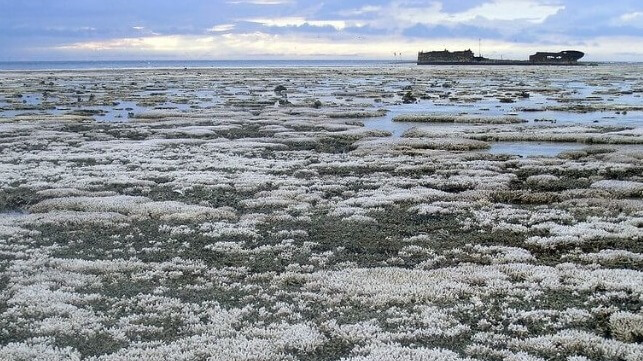A New Global Coral Bleaching Event is Under Way, and May Be the Worst Yet

Reports of serious coral bleaching at Australia's Great Barrier Reef, the coast of Florida, and the South Pacific have been building for months, and NOAA scientists have now declared a global bleaching event. It is the second in ten years and the fourth on record.
The event spans from February 2023 until the present, starting at about the same time that global sea surface temperatures began to set new daily records every day. Widespread bleaching has been reported on both sides of the equator in each major basin (Indian Ocean, Pacific and Atlantic). At some point in the past 14 months, bleaching has been reported across the expanse of the South Pacific, the Caribbean, the Red Sea, the Persian Gulf, and along the full width of the Indian Ocean.

A mass of red covers the tropics in this depiction of peak marine heat stress levels seen in 2023-2024. The alert level is calculated based on length of time spent at sea surface temperatures that are high enough to cause bleaching (NOAA)
While this is concerning to conservationists, it has implications for all nations that depend on ocean resources. Coral reefs are nurseries for some of the world's most important commercial fisheries, and the estimated economic value that they provide is roughly equal to the GDP of France.
“As the world’s oceans continue to warm, coral bleaching is becoming more frequent and severe,” said Derek Manzello, Ph.D., NOAA Coral Reef Watch coordinator. “When these events are sufficiently severe or prolonged, they can cause coral mortality, which hurts the people who depend on the coral reefs for their livelihoods.”
The agency's criterion for a "global" bleaching event is that every major ocean basin has been affected within the last year, including 12 percent of the coral within each basin. At present, a total of about 54 percent of the world's coral is affected, and that number is going up by about one percent weekly.
At this rate, the current bleaching event is on track to become the worst on record, and soon. The previous record from 2014-17 stands at 56 percent of all coral affected. The Great Barrier Reef is already in the midst of its most significant bleaching event on record.
Climate scientists have been warning about the likelihood of climate-linked severe bleaching events for decades. But not all is lost: NOAA says that reefs can recover from bleaching if the severe heat recedes. Scientists are also actively stockpiling viable specimens of coral and storing them cryogenically, so that any extinguished populations can be re-seeded with samples in years to come. NOAA has also experimented with novel interventions, like putting sunshades over a few reefs to ensure survivors, or moving manmade coral nurseries to deeper, cooler waters.
Those techniques will be needed in the years ahead, says Manzello. "Current climate models suggest that every reef on planet Earth will experience severe, annual bleaching sometime between 2040 and 2050," he told The Guardian.
No comments:
Post a Comment